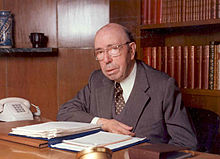Antoni Esteve Subirana
Like his father (Josep Esteve i Seguí), Antoni became involved in his country's social, cultural, and political life, although he never agreed to serve in public office.
His plans to write his thesis in chemistry in Barcelona were interrupted by the unexpected death of his father in 1927, and he was obliged to make the family pharmacy in Manresa his first priority.
In parallel, Antoni Esteve invested heavily in the push to attain organic arsenic compounds for the treatment of syphilis (marketed in 1934 as Neo-Spirol).
During the Spanish Civil War, Antoni Esteve carried on working at the pharmacy in Manresa, and his laboratory was key in providing sulfonamides to treat infections, as it became more and more difficult to import these drugs from Germany.
When Catalonia was definitively occupied by Franco's Nationalist army, Antoni Esteve went into exile in France, where he associated with prominent figures in the pharmaceutical industry and worked in a prestigious laboratory.
A short time later, the Second World War broke out and the advance of German troops across France forced him to return to Barcelona, where he was put on trial for political responsibilities and sentenced to pay a fine.
After returning from exile, the laboratory was moved to Barcelona, starting a new chapter in the history of the company marked not only by progressive expansion, but also by the introduction of original drug preparations into the market.
